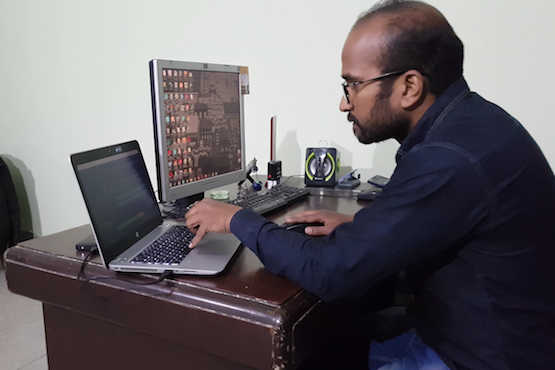
Francis Xavier edits Radio Veritas Asia programs in the social media office at WAVE studio in the National Catholic Social Communication Center in Lahore. (Photo by Kamran Chaudhry)
As more Christians in Pakistan are accused of blasphemy, the country's only Catholic Church-run social media department has decided to help them.
Father Qaiser Feroz, director of the Workshop Audio Visual Education (WAVE) studio at the National Catholic Social Communication Center in Lahore, said it is very important to warn people about the dangers of social media.
"Every church establishment in the country uses social media to promote its message, but there was no dedicated department or social media managers," he told ucanews.com.
"Everyone carries a smartphone, but there is no awareness. There is no limit to what they see and share. It is very important for the church to keep them informed about the dangers of using social media."
To counter the trend of blasphemy allegations as well as evangelize on cyberspace, Archbishop Joseph Arshad launched a social media and web development office in January at the communication center.
In November last year, Father Feroz conducted a seminar in Rawalpindi for teachers on using social media with responsibility. He plans another seminar for the youth of Lahore Archdiocese this summer. Catholic TV, run by Lahore Archdiocese, also hosts youth-oriented talk shows on safe surfing.
Father Feroz is among several church leaders who regularly attend protests and hunger strikes for Sajid Masih and Patras Masih, cousins accused of blasphemy over a picture posted on Facebook in January.
The case evoked international condemnation after Sajid Masih jumped from the fourth floor of the Punjab headquarters of the Federal Investigation Agency in a suicide attempt on Feb. 23 while being interrogated with his cousin.
Last year, Nadeem James, a Christian, was sentenced to death for sharing material ridiculing the Prophet Muhammad on the WhatsApp messaging service.
In 2016, the imam of a village in Punjab province instructed locals to boycott the Catholic community after Imran Masih, a janitor, was accused of watching an anti-Muslim video on YouTube.
Francis Xavier, social media manager at the communication center, regularly posts religious videos, promos of WAVE productions, Friday greetings, Radio Veritas Asia Urdu programs and announcements on social media platforms including YouTube.
But in May 2017 Xavier himself was accused of blasphemy.
"I was in Manila for social media training when one of our Muslim listeners, based in the United Arab Emirates, posted a critical comment in our WhatsApp group about Pakistani Muslims. Busy in sessions, I saw abuses and heated conversations a few days later. Meanwhile a listeners' club accused the group admin of blasphemy demanding action against me," he said.
"I called Father Feroz in the emergency and the group was ended. We never heard from those club members again."
The 30-year-old now spends most of his time filtering content. "We have more than 6,000 listeners [mostly Muslims] and 50 registered listeners' clubs. Every day I carry a mobile broadband device home to avoid any controversy," he said.
Blasphemy is a serious allegation in Pakistan, where a mere allegation of insulting Islam has led to mob attacks and the murder of religious minority members.
Under existing laws, punishment for blasphemy ranges from several years in prison to a death sentence. A person making a false accusation can only get a fine of 1,000 rupees (US$9) or a maximum jail term of six months.
In December, the federal cabinet approved an amendment to the Prevention of Electronic Crimes Act aimed at bringing blasphemy and pornography within the ambit of the cybercrime law.
In 2016, Pakistan lifted a three-year ban on YouTube. The ban was imposed to comply with a court order that sought to prohibit online content considered blasphemous by Muslims, such as low-budget film Innocence of Muslims. In 2012, the government blocked access to Twitter after it refused to remove tweets promoting a page urging people to post images of the Prophet Muhammad as part of a contest. Similarly, Facebook was blocked in 2010 after a competition page encouraged users to post drawings of the Prophet Muhammad.


